13 October 2014 – Five months have passed since the most recent internally displaced population (IDP) crisis in Iraq started. More than 860 000 IDPs moved out of their war-torn towns and cities in Ninewa and Salah Al Din governorates to the Kurdistan region of Iraq and the majority of them are now living in Duhok governorate often under untenable conditions, particularly for those who are not in organized camps.
In Duhok governorate, only 4 out of 14 planned camps are operational. An estimated 543 000 IDPs are scattered in 1678 sites, including schools, unfinished buildings and under bridges. Primary health care services are provided by mobile clinics visiting some of the sites, while some IDP patients are accessing health care centres in Duhok.
Photo gallery
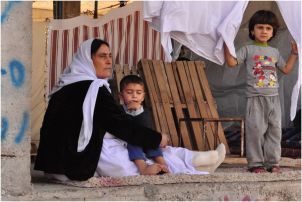 37 families sheltered in an unfinished building within Duhok City.
37 families sheltered in an unfinished building within Duhok City.
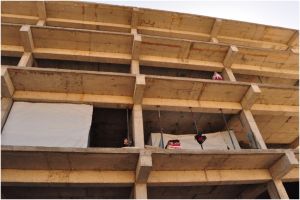 People have to use sheets of cloth in lieu of doors or walls to protect their children from injuries that could be caused by falling objects.
People have to use sheets of cloth in lieu of doors or walls to protect their children from injuries that could be caused by falling objects.
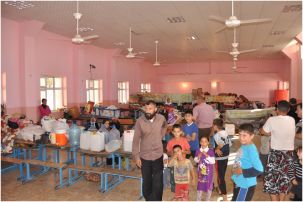 A total of 72 families were found living in an urban school in the centre of Duhok city.They share teaching halls and are living in very poor conditions without access to adequate water, food and sanitation.
A total of 72 families were found living in an urban school in the centre of Duhok city.They share teaching halls and are living in very poor conditions without access to adequate water, food and sanitation.
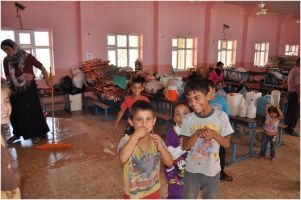 Despite the ongoing tragedy, children appear to be happy with the open space for playing. All children under five have been vaccinated against polio and measles during the September 2014 immunization campaign. Five national and subnational immunization rounds have been conducted since April 2014.
Despite the ongoing tragedy, children appear to be happy with the open space for playing. All children under five have been vaccinated against polio and measles during the September 2014 immunization campaign. Five national and subnational immunization rounds have been conducted since April 2014.
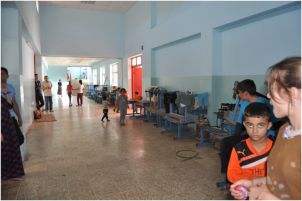 Students’ desks serving as cupboards and laundry drying strands.
Students’ desks serving as cupboards and laundry drying strands.
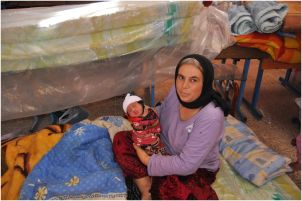 A lady has given birth to a baby girl two days before the day of the visit to the school. It was explained that she was taken by her husband to the closest hospital in Duhok where she delivered. She complained that her milk is not enough to feed the baby due to poor nutrition.
A lady has given birth to a baby girl two days before the day of the visit to the school. It was explained that she was taken by her husband to the closest hospital in Duhok where she delivered. She complained that her milk is not enough to feed the baby due to poor nutrition.
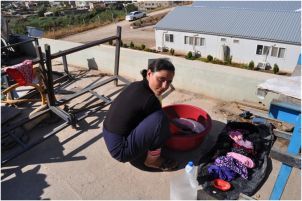 Even the roof of the school is in use as a space where many daily activities are performed. The risk of injuries occurring while children and women are performing basic daily household tasks is high.
Even the roof of the school is in use as a space where many daily activities are performed. The risk of injuries occurring while children and women are performing basic daily household tasks is high.
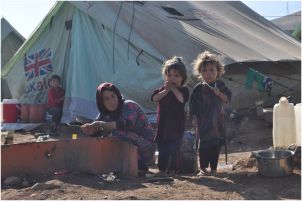 Dalal camp, an informal settlement located in Zakho city, about 60 km north of Duhok, accommodates 4018 IDPs mostly from Sinjar. Polio and measles vaccines were administered to all the 260 children under five in the camp.
Dalal camp, an informal settlement located in Zakho city, about 60 km north of Duhok, accommodates 4018 IDPs mostly from Sinjar. Polio and measles vaccines were administered to all the 260 children under five in the camp.
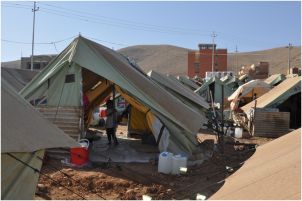 Other medical services are provided by Médecins Sans Frontière from 9.00 till 13:00 hours. This camp is another example of difficult living conditions with unhygienic sanitary conditions, a shortage of clean water and insufficient availability of food.
Other medical services are provided by Médecins Sans Frontière from 9.00 till 13:00 hours. This camp is another example of difficult living conditions with unhygienic sanitary conditions, a shortage of clean water and insufficient availability of food.
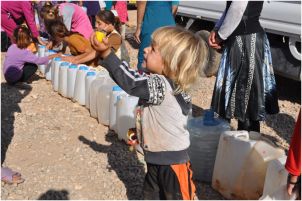 Queues of young women and girls wait their turn to fill their water buckets. Water is supplied to the camp by tankers.
Queues of young women and girls wait their turn to fill their water buckets. Water is supplied to the camp by tankers.
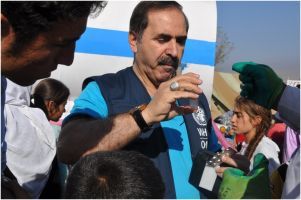 A WHO water and sanitation expert tests the water to check chlorine levels.
A WHO water and sanitation expert tests the water to check chlorine levels.
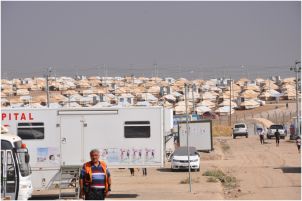 This picture was taken in Bajid Kandala transit camps 1 and 2, located in Zakho city and accommodating a population of 8000 IDPs. The camp residents receive food rations and have access to primary health care services provided by Première Urgence - Aide Médicale Internationale, an international nongovernmental organization that is a WHO implementing partner.
This picture was taken in Bajid Kandala transit camps 1 and 2, located in Zakho city and accommodating a population of 8000 IDPs. The camp residents receive food rations and have access to primary health care services provided by Première Urgence - Aide Médicale Internationale, an international nongovernmental organization that is a WHO implementing partner.
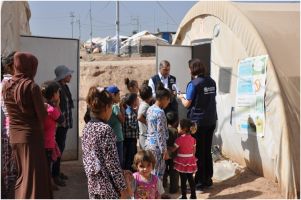 Khanke camp, 20 km from Duhok city is situated in Khanke, a town with a population of 23 000. About 60 000 IDPs are currently accommodated in the camp, mostly from Sinjar. Health services are provided by the local primary health care services. Full immunization against polio and measles has been achieved in the camp.
Khanke camp, 20 km from Duhok city is situated in Khanke, a town with a population of 23 000. About 60 000 IDPs are currently accommodated in the camp, mostly from Sinjar. Health services are provided by the local primary health care services. Full immunization against polio and measles has been achieved in the camp.
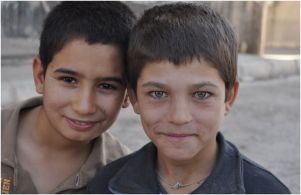 The construction of adequate shelters is of paramount importance to host the populations who are currently occupying schools and unfinished buildings and living under trees and bridges, suffering from a lack of water, hygiene and sanitation. Improving living conditions of IDPs, particularly the most vulnerable, can help bring some hope and even a smile.
The construction of adequate shelters is of paramount importance to host the populations who are currently occupying schools and unfinished buildings and living under trees and bridges, suffering from a lack of water, hygiene and sanitation. Improving living conditions of IDPs, particularly the most vulnerable, can help bring some hope and even a smile.



